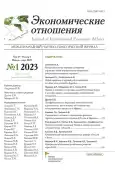Assessing Korea's trade stability against international economic crisis
- Authors: Nurieva A.R.1, Gibadullin M.Z.1, Gatina F.F.2
-
Affiliations:
- Kazan Federal University
- Kazan State Agrarian University
- Issue: Vol 13, No 1 (2023)
- Pages: 37-50
- Section: Articles
- URL: https://journals.eco-vector.com/2587-8921/article/view/607527
- DOI: https://doi.org/10.18334/eo.13.1.117243
- ID: 607527
Cite item
Abstract
In recent years, the system of international economic relations is experiencing a deep crisis. The model of the global liberal world order is undergoing a significant reformatting. At the same time, there is no methodology in the scientific literature that allows assessing the stability of trade and economic relations between the countries of the world. This does not allow an objective assessment of the nature and depth of the changes taking place in the world on the countries' positions in world trade. The method of analysis of the countries' foreign trade developed by the authors is aimed at solving this scientific problem. Based on the statistics of foreign trade of the Republic of Korea, which is one of the most developed economies of the modern world, the authors show how the structure of foreign trade relations of this country changes in the long term. The article will be of interest to those who professionally deal with the problems of the world economy and international economic relations, federal and regional government bodies responsible for the implementation of foreign trade relations, researchers, teachers and graduate students.FUNDING.This work was supported by the Core University Program for Korean Studies through the Ministry of Education of the Republic of the Korea and Korean Studies Promotion Service of the Academy of Korean Studies (AKS-2019-OLU-2250001)\"; \"이 논문 또는 저서는 2019년 대한민국 교육부와 한국학중앙연구원 (한국학진흥사업단)을 통해 해외한국학중핵대학육성사업의 지원을 받아 수행된 연구임 (AKS-2019-OLU-2250001).
About the authors
Aygul Rustamovna Nurieva
Kazan Federal University
Email: n.g.789@mail.ru
Marat Zufarovich Gibadullin
Kazan Federal University
Email: marat.gibadullin.1973@mail.ru
Farida Fargatovna Gatina
Kazan State Agrarian University
Email: statiskazgau@mail.ru
References
- Campbell K., Sullivan J. Competition Without Catastrophe: How America Can Both Challenge and Coexist with China // Foreign Affairs. – 2019. – № 98(5). – p. 96-110.
- Andresen M. Canada-United States interregional trade: quasi-points and spatial change // The Canadian Geographer. – 2010. – № 54(2). – p. 139–157.
- Gilmartin M., Learmouth D., Swales J.K., McGregor P., Turner K. Regional policy spillovers: The national impact of demand-side policy in an interregional model of the UK economy // Environment and Planning A. – 2013. – № 45 (4). – p. 814-834.
- Вардомский Л.Б. О взаимодействии России и Китая в Центральной Азии // Россия и Китай в условиях кризиса международной безопасности: Материалы Международной конференции. Москва, 2022. – c. 67-77.
- Рахимова М.А. Международное экономическое сотрудничество государств и особенности международных экономических организаций // Вестник Московского университета МВД России. – 2020. – № 8. – c. 175-181.
- Смирнов Е. Н. Детерминанты развития международной торговли в условиях гиперглобализации и цифровизации // Российский внешнеэкономический вестник. – 2019. – № 5. – c. 26-40.
- Рущицкая О.Е., Гоголина А.А. Современные формы, концепции и направления развития международных экономических отношений. / Социально-экономическое развитие: государственный, муниципальный и локальный уровни. Сб. статей круглого стола. - Екатеринбург: Изд-во Уральского государственного аграрного университета, 2022. – 121-126 c.
- Глобальные тенденции развития мировой экономики. / Архипова В.А., Бондаренко Н.В., Ефремов Н.А. и др. - Чебоксары, Изд-во Чувашский государственный университет им. И.Н.Ульянова, 2022. – 232 c.
- Бурденко Е.В., Данилушкина И.Д., Калмыкова А.И. Особенности современной мировой торговли и прогноз ее развития в постпандемийный экономике // Основы экономики, управления и права. – 2020. – № 6. – c. 38-42.
- Басовская Е.Н., Басовский Л.Е. Перспективы развития системного мирового экономического кризиса // Научные исследования и разработки. Экономика. – 2019. – № 1. – c. 4-7.
- Перская В.В., Хомякова Л.И. Глобальные цепочки стоимости как трансформационный индикатор изменений в мировой экономике // Вопросы региональной экономики. – 2021. – № 1(46). – c. 223-233.
- Дробот Е.В. Новый мировой экономический порядок в постпандемический период: соперничество между Китаем и США // Экономические отношения. – 2022. – № 1. – c. 51-68.
- Корнеев К.А. Торгово-экономическое сотрудничество Японии и Республики Корея: исторический контекст и новые реалии. / Корейский полуостров: история и современность / Сб. ст. - М.: Изд-во ИДВ РАН, 2020. – 160-169 c.
- Кистанов В.О. Отношения между Японией и Южной Кореей: проблемы, тенденции, перспективы // Японские исследования. – 2019. – № 3. – c. 33-48.
- World Trade Statistical Review 2013. - World Trade Organization, 2013. – 26 p.
- World Trade Statistical Review 2014. - World Trade Organization, 2014. – 44 p.
- World Trade Statistical Review 2015. - World Trade Organization, 2015. – 95 p.
- World Trade Statistical Review 2016. - World Trade Organization, 2016. – 103 p.
- World Trade Statistical Review 2017. - World Trade Organization, 2017. – 125 p.
- World Trade Statistical Review 2018. - World Trade Organization, 2018. – 101 p.
- World Trade Statistical Review 2019. - World Trade Organization, 2019. – 83 p.
- World Trade Statistical Review 2020. - World Trade Organization, 2020. – 59 p.
- World Trade Statistical Review 2021. - World Trade Organization, 2021.
- Официальный сайт Таможенной службы Республики Корея. [Электронный ресурс]. URL: https://unipass.customs.go.kr/ets/index_eng.do (дата обращения: 12.12.2022).
Supplementary files








